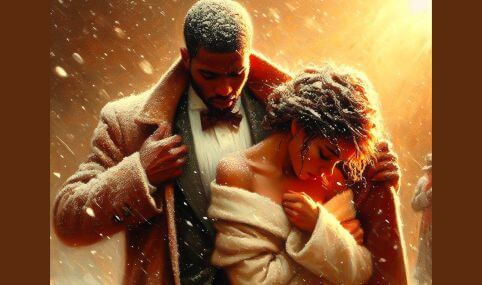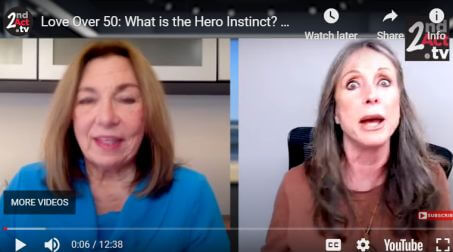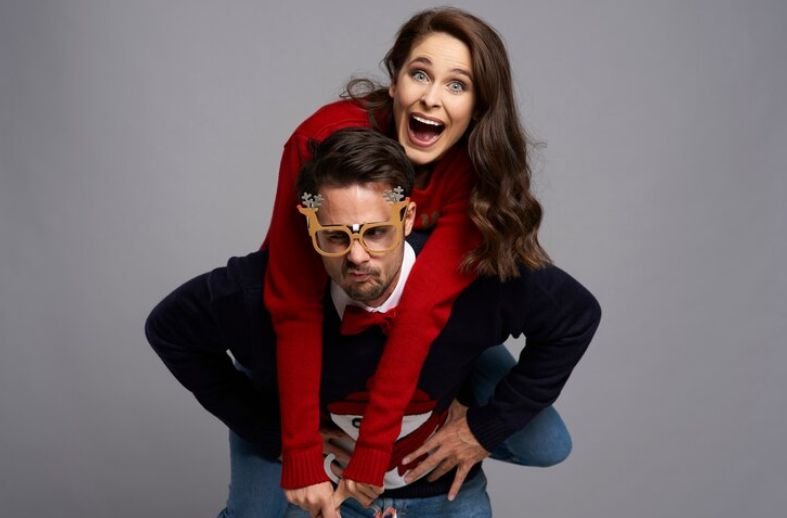Last updated on June 6th, 2025 at 05:58 pm
In relationships, one underrated biological motivation and desire that drives partners is the hero instinct. And here is everything you want to know about it.
Ever feel like your connection with him is strong, yet something still seems missing?
You support him, share your thoughts, and spend quality time together, but the bond doesn’t always deepen the way you expect.
There’s a part of him that responds not just to love or attraction, but to feeling needed in a very specific way.
It’s the trigger that makes him feel seen, respected, and deeply invested in you.
Understanding this can shift how your relationship grows and how secure he feels with you.
It’s not about changing who you are or playing roles, it’s about recognizing what silently fuels his loyalty and commitment.
If you’ve sensed emotional distance or mixed signals, this may be what you’re overlooking.
Let’s break down what drives that hidden response and how it changes everything.
Recommended: What is Primal Instinct?
Table of Contents
- What is Hero Instinct?
- The Origins and Psychology of the Hero Instinct
- Hero Instinct in Men
- How Hero Instinct Trigger Women
- The Impact of the Hero Instinct on Relationships
- Hero Instinct Examples
- Hero Instinct Phrases
- Nurturing and Sharpening Your Hero Instinct as a Man
- Misconceptions about the Hero Instinct
- Controversy Surrounding Hero Instinct
- Pitfalls of Hero Instinct
- Watch this Video of What Hero Instinct is (12mins 38sec)
- Frequently Asked Questions
- Final Word from The Conducts of Life
What is Hero Instinct?
Hero Instinct is a psychological theory that suggests men have an innate desire to fulfill a hero role in their relationships.
It refers to a man’s need to feel wanted, needed, and respected by his partner.
This instinctual drive stems from a deep-seated biological need to provide and protect, which can manifest in various ways, such as solving problems, being a shoulder to lean on, or taking charge in difficult situations.
Men who feel the instinct is activated experience a heightened sense of purpose and fulfillment in their relationship, leading to a stronger bond and overall satisfaction.
Related: Dangers of Suppressing Your Instincts
The Origins and Psychology of the Hero Instinct
The protector instinct is rooted in evolutionary biology and psychology.
It is a psychological concept that suggests men have an innate desire to protect, provide, and feel valued.
It is theorized that this instinct stems from evolutionary psychology, where men were traditionally expected to be the providers and protectors of their families or communities.
Throughout history, men have been driven by the desire to protect and provide for their loved ones.
This instinct is deeply embedded within the male psyche, and it speaks to a man’s need for purpose and significance.
In prehistoric times, men were responsible for hunting and gathering resources to ensure the survival of their families and communities.
This primal urge to be a provider and protector has been carried forward through generations, although its context and expressions have evolved.
Today, the saviour instinct manifests itself in different ways, but the core desire to make a meaningful impact on their partner’s life remains.
Related: Differentiating Primal Instincts and Emotional Intelligence
Hero Instinct in Men
In modern relationships, the saviour instinct influences men’s behaviours, attitudes, and choices.
Men may feel a sense of fulfillment when they can support their partners emotionally, financially, or even through simple acts of kindness.
They seek opportunities to showcase their capabilities and make a difference in their loved ones’ lives, fulfilling their innate desire to be a hero.
It is important to note that the instinctive desire to be a hero is not exclusive to men.
Women can also experience a similar drive, but the emphasis on this article will be on the male perspective.
Recognizing and honoring the instinctive desire to be a hero in both partners can sustain healthier and more fulfilling relationships.
Related: Many Ways Primal Instinct Keeps You Alive
How Hero Instinct Trigger Women
The instinct of heroism in women suggests that women are instinctively drawn to men who can provide a sense of protection, security, and competence.
It is believed to be rooted in the evolutionary behaviour of women seeking partners who can contribute to their survival and the well-being of potential offspring.
While not universal, this instinct can manifest in various ways, such as admiration for men who display bravery, leadership, and problem-solving skills.
Women may feel a strong attraction towards individuals who fulfill this hero archetype, as it satisfies their subconscious desires for safety and stability.
Related: Impact of Primal Instincts in Modern Society
The Impact of the Hero Instinct on Relationships

The heroic instinct can have a profound impact on relationships, positively shaping them when understood and expressed healthily.
When a man feels needed and valued, it boosts his self-esteem, creating a sense of purpose and motivation.
This, in turn, enhances his commitment and dedication to the relationship, leading to increased satisfaction for both partners.
On the other hand, when the hero instinct is ignored or suppressed, it can lead to frustration, resentment, and ultimately, relationship dissatisfaction.
If a man’s desire to provide and protect is thwarted, he may feel unappreciated or emasculated.
This can result in a breakdown in communication, decreased intimacy, and even a withdrawal from the relationship.
Sustaining the Instinctive Desire to be a Hero for a Healthy Relationship
Understanding and acknowledging the desire to be a hero is crucial for building a strong and healthy relationship.
Here are some strategies to sustain this desire in your partnership:
1. Communicate Openly
Express your needs and desires, allowing your partner to understand how they can support you.
Honest and open communication helps establish a foundation of mutual understanding.
2. Show Appreciation
Acknowledge and appreciate your partner’s efforts, big and small.
Recognizing their contributions helps them feel valued and reinforces their role as a hero in your life.
3. Share Responsibilities
While men may naturally gravitate towards taking charge, it is essential to share responsibilities in a relationship.
Collaborative decision-making and equitable distribution of tasks ensure both partners can contribute and feel valued.
4. Encourage Autonomy
Allow your partner space to pursue their interests and goals.
Supporting their personal growth fosters a sense of empowerment and enables them to become their best selves.
5. Offer Encouragement
Encourage your partner to take risks, pursue challenges, and overcome obstacles.
Believing in their capabilities can ignite their desire for heroism and help them rise to the occasion.
6. Prioritize Emotional Connection
Emotional intimacy is the foundation of a healthy relationship.
Engage in meaningful conversations, support each other’s emotional needs, and establish a safe space for vulnerability.
Hero Instinct Examples

Here are a few examples to illustrate the instinctive heroism:
1. In a Dangerous Situation
When faced with a dangerous or threatening situation, the instinct of heroism prompts men to step up and protect those around them.
They might feel a strong sense of responsibility to ensure the safety of their loved ones, friends, or even strangers.
This can manifest as jumping in to help during a physical altercation, assisting someone in need, or providing emotional support during challenging times.
2. Solving Problems
Men often feel a deep need to fix problems and provide solutions.
Whether it’s addressing technical issues, repairing things around the house, or offering advice, they enjoy the feeling of being the go-to person who can offer assistance.
This can be seen at home, in the workplace, or within relationships.
By satisfying their instinct, men feel accomplished, valuable, and appreciated.
3. Providing Emotional Support
The protector instinct also extends to providing emotional support, as men want to be there for their partners and loved ones during times of distress.
They want to offer a safe space to express feelings, listen attentively, and provide comfort.
By being a reliable source of emotional support, men can fulfill their desire to be heroes and strengthen their connection with others.
4. Sacrificing for the Well-being of Others
Men often have an innate desire to sacrifice their own needs and desires for the well-being of others.
This can be seen in various aspects of life, such as putting the needs of their family before their own, working long hours to provide for loved ones, or compromising personal goals to support someone else’s dreams.
By prioritizing the well-being and happiness of others, men satisfy their instinct and take on the role of a protector.
Again, it’s important to note that the instinctive desire to be a hero is not limited to men only, as many women can also experience similar inclinations to protect and provide.
Additionally, while the desire to be a hero can be a natural and positive aspect of relationships, it should be balanced with equality, cooperation, and mutual support.
Hero Instinct Phrases
Here are some examples of hero instinct phrases:
1. “I feel safe and protected when I’m with you.”
2. “Your strength and support mean the world to me.”
3. “I trust your judgment; you always know how to handle things.”
4. “I appreciate your unwavering support and guidance.”
5. “You make me feel like I can conquer the world.”
6. “I feel so lucky to have you by my side; you’re my rock.”
Nurturing and Sharpening Your Hero Instinct as a Man

As a man, nurturing and sharpening your saviour instinct can be achieved by developing and cultivating your innate desire to protect, provide, and take care of others, especially those close to you.
It involves honing your instinct to be a hero in your relationships, whether it be with your partner, family, friends, or society at large.
Let’s take a closer look:
1. Be Emotionally Available
Nurturing your instinctive hero desire dictates that you have to be emotionally available and supportive, actively listening, and empathizing with others.
It means being attentive to their needs and being willing to lend a helping hand or shoulder to lean on when needed.
This nurturing aspect involves promoting trust and open communication, creating a safe and supportive environment for those around you.
2. Improve Practical Knowledge and Skills
On the other hand, sharpening your protector instinct involves developing and improving your practical skills, knowledge, and abilities to better serve and protect others.
This can range from developing physical strength and self-defense skills, being a handyman, to being financially responsible and career-driven to provide for your loved ones.
Sharpening your instinct of heroism also entails honing your problem-solving abilities, being proactive, and taking on leadership roles when necessary.
Premium Tip: By nurturing and sharpening your protector instinct, you become a more well-rounded and dependable man in the eyes of those around you.
You actively contribute to the well-being and happiness of others, while also fostering personal growth and fulfillment within yourself.
It is important to approach this instinct with balance, ensuring that you are not overly dominant or dismissive of the needs and desires of others, but rather, using your hero instinct as a force for good in the lives of those you care about.
Misconceptions about the Hero Instinct
There are several misconceptions about this concept that need to be debunked.
Misconception 1: The Hero Instinct is a Universal Truth
Debunking: While the hero instinct may resonate with some men, it’s not a universal truth that applies to all individuals.
Not all men have the same desires or motivations, and it is important to respect and acknowledge individual differences.
Misconception 2: The Hero Instinct Is Solely a Male Phenomenon
Debunking: It is often discussed about men, but it is not exclusive to males.
People of any gender can experience the desire to be needed or valued.
Therefore, it is important to recognize that individuals’ desires and motivations are not solely determined by their gender.
Misconception 3: Fulfilling the Hero Instinct is Solely a Man’s Responsibility
Debunking: The responsibility to fulfill the desire to be a hero should not fall solely on men.
Building a healthy and fulfilling relationship requires effort from both partners.
Women need to communicate their needs and desires, while men should actively seek to understand and respond to these needs.
Misconception 4: The Hero Instinct is Manipulative or Outdated
Debunking: The desire to be a hero is often misconstrued as an outdated belief that supports gender stereotypes or promotes unnecessary dependency in relationships.
However, understanding and valuing a partner’s needs and desires is an integral part of building strong and healthy relationships.
It becomes problematic only when it is used to manipulate or control others.
Controversy Surrounding Hero Instinct
The concept of the “Hero Instinct” has generated some controversies and debates among relationship experts and psychologists.
Let’s take a closer look:
1. Generalization of Gender Roles and Stereotypes
One controversy surrounding the concept is its generalization of gender roles and stereotypes.
Critics argue that reducing men’s desires and motivations to this singular instinct oversimplifies the complexity of human behaviour and relationships.
It can perpetuate traditional gender norms, which may not apply to every individual or relationship.
2. Commercialization and commodification of the Hero Instinct
Another concern is the commercialization and commodification of the concept.
This theory is often used to market relationship advice programs or dating products, leading some to question its scientific validity and authenticity.
Skeptics argue that it is merely a marketing ploy designed to capitalize on people’s insecurities and desires for successful relationships.
3. Some Experts Question the Evolutionary Theory of the Hero Instinct
While proponents argue that this instinct evolved as a survival mechanism for humans, researchers argue that it is difficult to provide conclusive scientific evidence for it.
The idea that men are primarily driven by an instinctual need to protect and provide may overlook a variety of other individual and cultural factors that influence behaviour.
4. Potential for Unhealthy Relationship Dynamics
Finally, the theory also raises concerns about the potential for unhealthy relationship dynamics.
Critics argue that idealizing a partner as the hero could encourage codependency or unrealistic expectations within a relationship.
It may place undue pressure on men to fulfill societal expectations of heroism and lead to feelings of inadequacy or failure if they cannot consistently meet those standards.
Pitfalls of Hero Instinct
While this instinct can be beneficial in creating a strong bond between partners, it can also lead to certain pitfalls if not understood and managed properly.
Some of the pitfalls include:
1. Unbalanced Power Dynamics
The protector instinct can inadvertently create an unbalanced power dynamic in a relationship.
If one partner consistently takes on the role of the hero, always coming to the rescue and being the saviour, it can undermine the equality and autonomy of the other partner.
It may lead to a dependence on the hero partner, eroding self-esteem and personal agency in the process.
2. Sustained Stress and Pressure
The saviour instinct can place a significant amount of stress and pressure on the person seeking to fulfill it.
They may feel the need to constantly take charge, solve problems, and meet the expectations of their partner.
This sustained pressure can lead to burnout, as they may neglect their own needs and become overwhelmed trying to live up to the hero archetype.
3. Unmet Expectations
The protector instinct of a hero can create unrealistic expectations in relationships.
When one partner starts relying on the other to fulfill their protector instinct, they may begin to expect constant heroic acts and validation.
Inevitably, neither partner can continuously meet these expectations, leading to disappointment, resentment, and relationship dissatisfaction.
4. Suppression of Vulnerability
Due to the emphasis on being strong, reliable, and unshakable, the hero instinct may discourage the expression of vulnerability.
Men may feel compelled to hide their emotions, struggles, or weaknesses, fearing that it will compromise their hero status.
This suppression can hinder healthy emotional intimacy and prevent authentic connections from forming.
5. Neglecting Self-care
It can make you prioritize the needs of others above your own.
In the pursuit of constantly proving yourself and fulfilling the hero role, you may neglect self-care, personal growth, and your well-being.
This can lead to emotional exhaustion, decreased self-worth, and an imbalance in personal fulfillment.
Watch this Video of What Hero Instinct is (12mins 38sec)

Frequently Asked Questions
What is the hero instinct?
It is a man’s innate drive to provide, protect, and be a valued hero in a relationship.
How does the hero instinct impact relationships?
It can deepen emotional connection, promote trust, and lead to a more fulfilling and balanced partnership.
Can women have a hero instinct?
Yes, women can also have a hero instinct, expressing protective and nurturing behaviors in relationships.
How can one nurture the hero instinct in a partner?
Nurturing the protector instinct involves showing appreciation, allowing them to provide support, and acknowledging their efforts in the relationship.
Final Word from The Conducts of Life
Understanding the hero instinct provides valuable insights into relationship dynamics and allows partners to create healthier, more fulfilling connections.
By recognizing and honoring the innate desire to be a hero, men can find meaning and purpose within their relationships.
For both men and women, creating an environment that supports the desire to be a hero promotes mutual understanding, appreciation, and a sense of fulfillment.
References:
- https://practicalpie.com/hero-instinct/
- https://diversity.social/hero-instinct/
- https://www.linkedin.com/pulse/james-bauer-hero-instinct-unveiling-core-concept-suman-das-uirdc
- https://texttriggers.com/hero-instinct/
Pious Clements is the insightful voice behind "The Conducts of Life" blog, where he writes about life ethics, self-development, life mastery, and the dynamics of people and society.
With a profound understanding of human behaviuor and societal dynamics, Pious offers thought-provoking perspectives on ethical living and personal growth.
Through engaging narratives and astute observations, he inspires readers to navigate life's complexities with wisdom and integrity, encouraging a deeper understanding of the human experience and our place within society.

